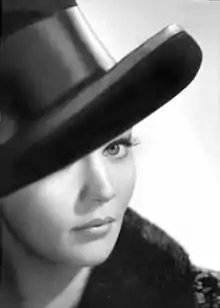Annemarie Heinrich
Annemarie Heinrich (9 January 1912 – 22 September 2005) was a German-born naturalized Argentine photographer, who specialized in portraits and nude photographs. Heinrich is considered one of Argentina's most important photographers.[1][2]
Annemarie Heinrich | |
|---|---|
 Heinrich photographed by her son Ricardo Sanguinetti | |
| Born | 9 January 1912[1] |
| Died | 22 September 2005 (aged 93) La Chacarita Cemetery, Buenos Aires, Argentina |
| Nationality |
|
| Occupation | Photography |
She is known for having photographed various celebrities of Argentine cinema, such as Tita Merello, Carmen Miranda, Zully Moreno and Mirtha Legrand; as well as other cultural personalities like Jorge Luis Borges, Pablo Neruda and Eva Perón.[1][3][4] She also photographed landscapes, city scenes, animals, and abstracts.[5] Her photographs of South America hold significant ethnographic value, showing changes to the area through the 20th century.[6]
Early life
Heinrich was born in Darmstadt. She went to school in Berlin, before moving to Larroque, Entre Ríos Province, with her family in 1926, her father having been injured during the First World War. Heinrich studied dance, music, and scenography, which would contribute to her distinctive photographic style and dramatic use of lighting.[7]
Heinrich apprenticed with other European expatriate photographers, including Austrian photographer Melitta Lang.[8]
Career
In 1930, she opened her first studio in Villa Ballester, Buenos Aires.[9] She also married Ricardo Sanguinetti, a writer under the name Alvaro Sol, in the same year.[10] Two years later she moved to a larger studio and began photographing actors from the Teatro Colón.[3][2]
Heinrich co-founded Foto Club Argentino and was a founding member of Consejo Argentino de Fotografía (Argentine Council on Photography) and the Consejo Latinoamericano de Fotografía (Latin American Council on Photography).[10] Her photos were also the cover of magazines such as El Hogar, Sintonía, Alta Sociedad, Radiolandia and Antena for forty years.[1][2]
In Argentina during the Second World War, Heinrich was part of the anti-war movement, Consejo Argentino por la Paz (Argentine Council for Peace). She was also in the Junta de la Victoria (Victory Board), a women's group advocating against fascism and for the Allies.[10] After the war, Heinrich travelled across Europe, exhibiting her work in Rome, Milan, Paris, and Zürich.[10] In the 1950s Heinrich was part of a modernist group calling themselves Carpeta de los diez (Group of Ten).[11]
Heinrich was brought to court in 1991 for displaying one of her nude photographs in the Avenida Callao studio window. National and international outcry in support of Heinrich and the aesthetic value of the photograph led to the case being dropped.[12]
In 2015, the Museo de Arte Latinoamericano de Buenos Aires held a retrospective of her work.[11] Heinrich's work was shown in New York for the first time in 2016 at Nailya Alexander Gallery in the show "Annemarie Heinrich: Glamour and Modernity in Buenos Aires."[13]
Heinrich's archive has been digitised in a project between the British Library Endangered Archives Programme and the Institute for Research in Art and Culture, Universidad Nacional de Tres de Febrero, in 2016.[6] The collection is available online at the Endangered Archives Programme website.
Gallery
 Self-portrait with Ursula, 1938
Self-portrait with Ursula, 1938 Eva Duarte, 1939
Eva Duarte, 1939 La Paloma, 1945
La Paloma, 1945 Mirtha Legrand, c. 1955
Mirtha Legrand, c. 1955

 Pinky, 1964
Pinky, 1964
References
- "Murió Annemarie Heinrich, la fotógrafa mayor de la Argentina". Clarín. 23 September 2005. Retrieved 11 January 2013.
- "Annemarie Heinrich, maestra de la luz". La Nación. 23 September 2005. Archived from the original on 1 June 2016. Retrieved 11 January 2013.
- "El poder de una mirada". Government of Buenos Aires. Retrieved 11 January 2013.
- Carmen María Ramos (31 October 2004). "Annemarie Heinrich: lo bello y lo profundo". La Nación. Archived from the original on 23 January 2019. Retrieved 11 January 2013.
- Miles, Robert (26 November 2015). "EAP755: Annemarie Heinrich Photograph Collection". Endangered Archives Programme. Archived from the original on 15 June 2018. Retrieved 11 May 2021.
- "A modern gaze on old cultural practices in Argentina: relocation and preservation of the 'Heinrich Sanguinetti Archive' (1930-1956) (EAP755)". British Library Endangered Archives Programme. 6 September 2017. Archived from the original on 1 March 2018. Retrieved 11 May 2021.
- Foster, David William (2014). "Annemarie Heinrich: Photography, Women's Bodies, and Semiotic Excess". Argentine, Mexican, and Guatemalan Photography: Feminist, Queer, and Post-Masculinist Perspectives. University of Texas Press. p. 23.
- Niedermaier, Alejandra (2008). La mujer y la fotografía : una imagen espejada de autoconstrucción y construcción de la historia (in Spanish). Buenos Aires: Leviatán. pp. 110–111.
- Facio, Sara. "Comentario sobre Desnudo". Museo Nacional de Bellas Artes (in Spanish). Retrieved 13 May 2021.
- "Annemarie Heinrich". Nailya Alexander Gallery. Archived from the original on 28 October 2018. Retrieved 11 May 2021.
- Great women artists. Phaidon Press. 2019. p. 180. ISBN 978-0714878775.
- Facio, Sara. "Comentario sobre Desnudo". Museo Nacional de Bellas Artes (in Spanish). Archived from the original on 24 November 2016. Retrieved 13 May 2021.
- "Annemarie Heinrich: Glamour and Modernity in Buenos Aires". Nailya Alexander Gallery. 7 January 2016. Archived from the original on 12 February 2016. Retrieved 30 January 2016.
External links
- Entry about Annemarie Heinrich in METROMOD archive by Laura Karp Lugo